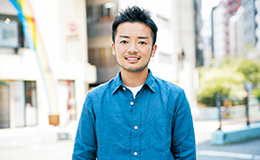
 Dialogue 01A Flourishing and Inclusive Society Offering Happiness to All
Dialogue 01A Flourishing and Inclusive Society Offering Happiness to All
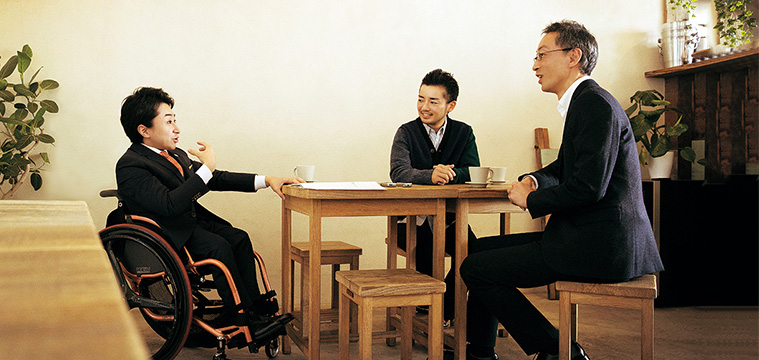
-
- Toshiya Kakiuchi (left)
- President, Mirairo Inc.

-
- Fumino Sugiyama (center)
- Co-Representative
Nonprofit Organization
TOKYO RAINBOW PRIDE

-
- Hiroshi Aoi (right)
- President and Representative Director
Representative Executive Officer
MARUI GROUP CO., LTD.
MARUI GROUP hopes to contribute to the realization of a flourishing society in which everyone can be included and find happiness regardless of their age, gender, or physical characteristics. This was the theme of the discussion between Toshiya Kakiuchi, a universal design specialist that advocates the concept of "Barrier Value," or viewing disabilities as a type of value; Fumino Sugiyama, an organizer of Japan's largest LGBT pride event; and President Hiroshi Aoi of MARUI GROUP. These three discussed the potential of inclusion and the role MARUI GROUP should play in this regard.
A Society Offering Happiness to All
Aoi: MARUI GROUP has decided to shift its emphasis from CSR to sustainability. The concept of "inclusion" will be important to achieving sustainability. We have previously evoked this concept with phrases like "for all customers." For example, we feel that shopping experiences and services should be enjoyable for all customers, not just a select few. If we cannot accomplish this, society cannot be said to be truly flourishing. Including all customers, regardless of their age, gender, or physical characteristics, will be crucial to the society of the future. I believe that there is a lot of overlap to be found between businesses that offer joy to all customers and universally open societies that provide happiness for all.
Sugiyama: What turned you on to this idea of "for all customers"? When you, President Aoi, requested that I give a lecture on the idea of "for all customers," I was very glad. In the past, I had felt like I was not included within the "all." As I do not identify as traditionally male or female, people would pretend that I did not exist, even if they were aware of my existence. If I did not speak up, no one would understand my needs. This situation made me feel as if I was invisible. Now, however, I truly feel as though we are entering into an era in which people like me are included within the "all."
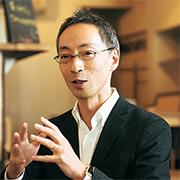
Aoi: In the past, MARUI GROUP had primarily focused on younger customers. However, I could not help but feel opposed to this idea of excluding some customers. Companies should not be selective in their target customers, but should rather try to bring joy to as many customers as possible. When I thought about this, I arrived at the idea of "for all customers."
Kakiuchi: So you mean to say that there was some basis for your arrival at this idea, such as an ideological stance that people with disabilities and members of the LGBT community should be included in the "all." I believe that MARUI GROUP's current inclusion initiatives are truly symbolic. The way in which society views different individuals is changing. When people talk about my wheelchair in the same manner they might talk about someone's shirt, it makes me realize how much people like me have come to be accepted by society.
Aoi: When you told me that story, it made me very happy. It is reassuring to hear that you are accepted in this way. I feel that my world has begun to grow much wider, encompassing realms I had not known before, after speaking with both of you and hearing your unique perspectives, and this feeling fills me with excitement and joy.
A Tomorrow in Which Labels Are No Longer Necessary
Aoi: I previously wondered why, despite the fact that the desire to help all customers was entrenched throughout MARUI GROUP, we did not get many customers in wheelchairs or with vision impairments. I soon realized it was because we did not actively reach out to these customers and invite them into our stores. It was then that I pledged to make our stores into the type of stores that all customers choose.
Kakiuchi: Japanese people tend to be a bit perfectionist, making it difficult for people to announce that their facility is equipped to accommodate differently abled individuals. For this reason, there are times when exceptional accessibility initiatives go unannounced, never reaching the ears of the individuals they seek to include or their families. It is not necessary for your accessibility initiatives to be perfect. If you want to include normally excluded individuals, your first step should be to express those feelings. Many will be inspired to visit your store by those feelings.
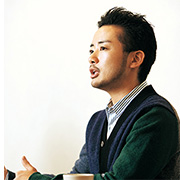
Sugiyama: Similarly, the allies that strive to understand and support the LGBT community are often invisible. The more progressive the company, the more they see such support as completely normal. These companies will not go out of their way to say "I am your ally." I too do not like to make distinctions between the majority and minorities, but if you do not make this clear, no one will know. We must use the label "LGBT" today in order to create a tomorrow in which this label is no longer necessary.
Kakiuchi: The label of "person with disabilities" is the same. The idea of categorizing people based on whether or not they have a disability may be nonsense, but there are times when this distinction must be made in order to resolve the issues we face. I hope to work together with everyone to create a society in which my using a wheelchair does not make me "different," but is rather seen as completely normal, a society in which there is no need to make a distinction between those with disabilities and those without.
Transition from an Age of Strength from Similarities to an Age of Strength from Differences
Sugiyama: The past was an age in which people drew strengths from their similarities. The so-called Japanese economic miracle was a period of growth built upon conformity. However, we are now entering into an age in which differences should be seen as strengths. No one is the same, and it is these differences that make life interesting.
Aoi: I too believe that life is more interesting because we are different. I often speak of how interesting diversity makes things. This is because I feel it is important to find joy in the differences of others, rather than just promoting diversity because of some kind of duty. By embracing the changes that have occurred and promoting further changes ourselves, we can build a different society.
Kakiuchi: Building tolerance for differences takes time, and tolerance can only be fostered through familiarity, which must be cultivated by means of frequent interaction. Speaking with you two today has made me once again realize the importance of telling the world of tomorrow about the power of differences and how interesting they make life.
Sugiyama: I think we need to change the mentality of acting "for minorities." A society that is kind to minorities will no doubt also be kind to the majority. Thus, addressing the needs of minorities will also likely help resolve the issues faced by majorities.
Aoi: That is an interesting idea. In the past, it seemed as though the world revolved around the majority. This was particularly true in the period of the Japanese economic miracle, when difficult times drove Japan to focus on the group with the largest numbers. This approach helped Japan prosper in the past, but the country has stopped growing today. Regardless of this fact, the majority still remains the focus. This seems strange to me. I can understand focusing only on the largest group when times are tough. However, when the immediate perils have been overcome, it is time to look to the prosperity of others. If we do not do this, what was the point of achieving prosperity in the first place?
Normalization of Inclusion
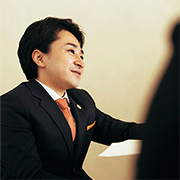
Kakiuchi: I often use the word "nonchalant." I think true inclusion only occurs when it is natural, or nonchalant, not when you go out of your way to give someone special treatment. For example, when MARUI GROUP expanded the range of sizes for its products, it naturally included people of sizes not seen as "standard." If people and companies adopt this approach when they consider previously marginalized people, I think the idea of inclusion will eventually become normalized.
Aoi: I do not like the word "disability," and I have recently been trying to say "physical characteristics" instead. Some may not like my lumping disabilities in with body sizes, but I believe these two categories are similar in that they are both ways in which we are all different.
Kakiuchi: I think that such approaches will help foster familiarity and acceptance more easily.
Sugiyama: I believe that familiarity is at the heart of this type of acceptance. If something is unfamiliar, people tend to erect mental barriers that make it difficult to say "I don't understand this." A person in a wheelchair, for example, is only inconvenienced when they come across steps, and can get around normally otherwise. For this reason, you could take the perspective that the disability comes from society, and not from the individual. It is crucial to share such perspectives with others. Understanding this perspective requires knowledge, which means that the number of opportunities to gain such knowledge is quite important. I ask people to tell me if there is anything they do not understand about me, but whether or not this communication occurs is determined by whether or not they take interest in others.
Mutual Progress to Turn Barriers into Value
Kakiuchi: There are several barriers that are created by ignorance, but I feel that the way society approaches such issues is changing as of late. In fact, it may be us who are not quite used to this change yet. If ignorance is replaced with knowledge and "cannot" is replaced with "can," then I think that the majority and minorities can make mutual progress and bridge the gap between each other. I use the word "Barrier Value" to refer to the idea of taking some kind of disability and turning it into some kind of value. We should not use disabilities as reasons to hurt others or impose ourselves on others. Rather, it is important to clarify the mutual value we present to one another.
Sugiyama: Marginalized individuals may not always be aware of it, but they can sometimes internalize prejudices or be slightly discriminatory toward society on the basis that society discriminates against them. What you said now made me think that, indeed, there may be a degree to which we ourselves are not used to society being used to us. I believe that both previously marginalized individuals and the majority want to build relationships with each other that allow them to mutually propose how they should interact, including with regard to such distinctions.
Aoi: Japan is entering into a new era, and in this era it will be important for both the largest group and other groups to flourish. I see you two as the type of individuals that will herald this change in the new era. I hope to work together with you in building a new society going forward.
Toshiya Kakiuchi
President, Mirairo Inc.
Mr. Kakiuchi was born in Nakatsugawa City, Gifu Prefecture in 1989. He established Mirairo in 2010 while attending the College of Business Administration at Ritsumeikan University. One in three of Mirairo's 35 employees have some kind of disability. From the perspective of "Barrier Value," turning a disability into a value, Mr. Kakiuchi offers universal design consulting services to companies, municipal government agencies, and educational institutions. In 2015, he became an advisor to the Nippon Foundation Paralympic Support Center. He was then appointed as an advisor to the Tokyo Organising Committee of the Olympic and Paralympic Games in 2016.
-
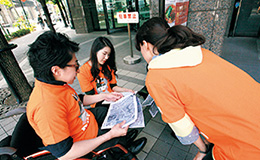
- Mirairo conducts investigations of facilities, products, apps, and other various articles and proposes improvements from the perspective of "Barrier Value."
-
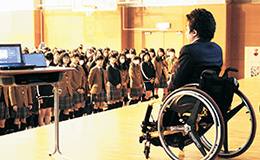
- Mr. Kakiuchi gives lectures at educational institutions as well as companies, and these lectures are a required part of the curriculum at Shinagawa Joshi Gakuin.
Fumino Sugiyama
Co-Representative,
Incorporated Nonprofit Organization
TOKYO RAINBOW PRIDE
Representative, Heart wo Tsunagou Gakko
Mr. Sugiyama is a transgendered individual born in 1981 that previously represented Japan in women's fencing. While in university, he wrote Double Happiness, which garnered much attention, eventually being translated into Korean and converted into a comic. After graduation, he embarked on a backpacking voyage, visiting around 50 countries and witnessing the social issues therein. Back in Japan, he now manages his own restaurant while also holding positions as co-representative of TOKYO RAINBOW PRIDE and representative of Heart wo Tsunagou Gakko, a nonprofit organization offering support for children that identify as sexual minorities. His other diverse activities include giving lectures and hosting a television program. Mr. Sugiyama helped establish Shibuya's ordinance recognizing same-sex partnerships, the first of its kind in Japan, and now serves on Shibuya's committee for promoting gender equality and diversity.
-
-

- Mr. Sugiyama is a co-representative of
TOKYO RAINBOW PRIDE, which holds Japan's largest LGBT pride event and also began conducting parades throughout Japan in 2016.
Stakeholder Engagement
-
- Dialogue 01
- A Flourishing and Inclusive Society Offering Happiness to All
-
- Dialogue 02
- Potential of MARUI GROUP's Business from the Perspective of Inclusion
-
- Dialogue 03
- Empowerment of Every Employee through Mutual Understanding
-
- Dialogue 04
- Multi-Stakeholder Perspective Enabling Challenges into Unexplored Realms
This sustainability website is designed to accommodate people with color blindness.







